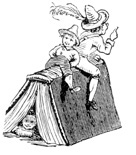
Sola Scriptura, an Impossible Theory
THE ISSUE OF AUTHORITY
One of the major differences between Catholics and Protestants concerns the question of authority. Where can the final authority for Christians on matters of faith and morals be found? The answer of most Protestants is clear: in the Bible alone. For example, the Baptist Confession of 1677 stated, “The Holy Scripture is the only sufficient, certain, and infallible rule of all saving knowledge, faith, and obedience.” Or as the sixth Article of Religion of the Church of England states:
Holy Scripture containeth all things necessary to salvation: so that whatsoever is not read therein, nor may be proved thereby, is not to be required of any man, that it should be believed as an article of the Faith, or be thought requisite or necessary to salvation.
And as an amusing little anti-Catholic tract published by Chick Publications puts it, the new Christian believer should look for “a church where…the Bible is the final authority.”
Such reliance on Scripture is often referred to as the doctrine of sola Scriptura, Latin for “by Scripture alone.” But sola Scriptura is not taught by the New Testament, and is in fact contrary to what is actually taught by both the New Testament and the earliest Fathers concerning the rule of our faith.
You May Also Enjoy
Advocates of the American death penalty must stop hiding behind the Bible, or rather behind those three verses they quote out of context.
We must have the courage of our own radical teachings and the moxie to explain what they mean (love) and why (for Christ!) rather than simply following fashions.
A wise and ancient scholar named Waniphallis (d. 666) once remarked to his Latin colleagues…

